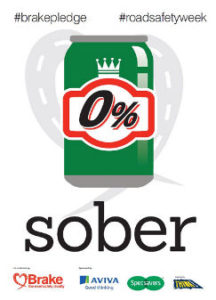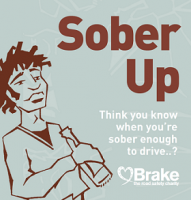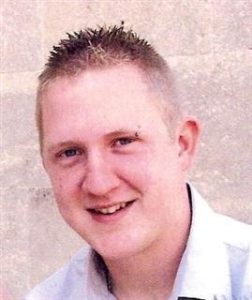 Drivers – I’ll never drive after drinking any alcohol or drugs – not a drop, not a drag.
Drivers – I’ll never drive after drinking any alcohol or drugs – not a drop, not a drag.
Everyone – I’ll plan ahead to make sure I, and anyone I’m with, can get home safely and I’ll never get a lift with drink/drug drivers. I’ll speak out if someone’s about to drive on drink or drugs.
Not a drop, not a drag
Even very small amounts of alcohol or drugs affect your driving and could cause a devastating crash. To keep yourself and others safe, never drink any alcohol or take any illegal drugs before driving: not a drop, not a drag.
 Just one small drink impairs your coordination, slows reactions and distorts judgement. You may feel fine, but your driving will be affected, which can easily lead to a crash that could end or ruin your life or someone else’s. Your ability to drive safely is affected when you’re still well under the UK drink drive limit of 80mg alcohol per 100ml blood. With just 20-50mg of alcohol per 100ml blood, your risk of being in a serious crash is three times greater than when you’re sober.
Just one small drink impairs your coordination, slows reactions and distorts judgement. You may feel fine, but your driving will be affected, which can easily lead to a crash that could end or ruin your life or someone else’s. Your ability to drive safely is affected when you’re still well under the UK drink drive limit of 80mg alcohol per 100ml blood. With just 20-50mg of alcohol per 100ml blood, your risk of being in a serious crash is three times greater than when you’re sober.
Cannabis affects your coordination and reactions, and makes you drowsy. Drugs like ecstasy, speed, cocaine and many legal highs can make you jumpy, paranoid, confused and overconfident. All these effects dramatically impact on your ability to drive safely.
Drugs and alcohol is an especially deadly combination.
Use Brake’s interactive sober up resource to learn more about drink and drug-driving.
Plan ahead
Always make sure you have a safe way to get home if you’re going out drinking, on foot if there’s a safe route, or by public transport or taxi. Planning ahead to get home safely will help you avoid getting into an awkward or risky situation, such as having to refuse a lift from a driver who has had alcohol. Leaving the decision until the pub, when you’ve already been drinking, is looking for trouble.
If you’re getting a lift back from a night out with someone, make sure they are 100% on board with not having any alcohol at all. Always have a plan B just in case a designated driver lets you down, or if you’re not confident arrange from the outset to get a taxi or public transport instead.
Speak out
 You don’t have to be confrontational to speak out to someone who’s thinking about drink or drug driving. You can talk to them in a friendly way, explaining why it’s a bad idea to get behind the wheel. You could offer to call them a taxi, walk them to the bus stop or walk them home. If they are insistent on driving you might have to be more firm, take their keys or even call the police.
You don’t have to be confrontational to speak out to someone who’s thinking about drink or drug driving. You can talk to them in a friendly way, explaining why it’s a bad idea to get behind the wheel. You could offer to call them a taxi, walk them to the bus stop or walk them home. If they are insistent on driving you might have to be more firm, take their keys or even call the police.
Drink driving is a serious offence with very serious consequences, which you want your friends and family to avoid. Not only could they end up losing their licence, they are putting themselves, their passengers and other road users at great risk of serious harm.
The morning after
Make sure you’ve completely got rid of any alcohol or drugs from your system before driving. Many drink and drug drivers are caught the next day. Drinking coffee, sleeping, or having a shower don’t help you sober up, only time.
As a rough guide, it takes at least one hour for the body to process each unit of alcohol. You should count the hours from the time you finished your last drink, but over-estimate as it could take longer depending on lots of factors. If you have to drive the next morning, limit yourself to no more than one or two drinks, and bear in mind that if you have a heavy night you could be impaired all of the next day.
See Brake’s factsheet on drink-driving for information on alcohol content of drinks and how long it takes to sober up or use Brake’s morning after calculator for an estimate of when you’ll be safe to drive after drinking.
Medication
It’s not just illegal drugs that make you unsafe to drive. Some medicines, such as strong pain killers and anti-depressants, are extremely dangerous to drive on. Even over-the-counter medicines such as some hayfever medication can impair your driving.
When taking any medicine, always check the label to see if it will affect your ability to drive. If you are unsure, consult your doctor or pharmacist. Never drive if the label or a health professional says your driving might be affected or if you feel drowsy or slow.
If your medication can affect driving, stop driving, not your medication – make arrangements for alternative transport. Or if you need to continue driving, seek alternative medication.
 Ashley’s story
Ashley’s story
Ashley Brixey died in a car driven by his friend who had been drinking and taking drugs.
Ashley went out on a Saturday night. At the end of the night, he got into the back of a car. A 17 year-old girl got into the passenger seat and Ashley’s friend Richard got behind the wheel.
Richard was twice over the drink-drive limit and had taken drugs. He lost control on a bend. The car went up an embankment, through a fence and landed upside down in a swimming pool. The girl and the driver got out but Ashley was knocked unconscious.
By the time the emergency services got there he was already dead.
- Read Brake’s factsheets on drink-driving and drug-driving
- Back our not a drop, not a drag campaign for zero tolerance on drink and drug driving
- Order hard copies or download Brake’s ‘Sober up’ leaflet on drink and drug-driving, or use our interactive sober up e-resource
- Pledge to never drive on drink and drugs
| Watch Barbara’s story. A drunk and drugged driver crashed into her car. She suffered full penetrative burns. Visit Brake’s Youtube channel for more videos. |

